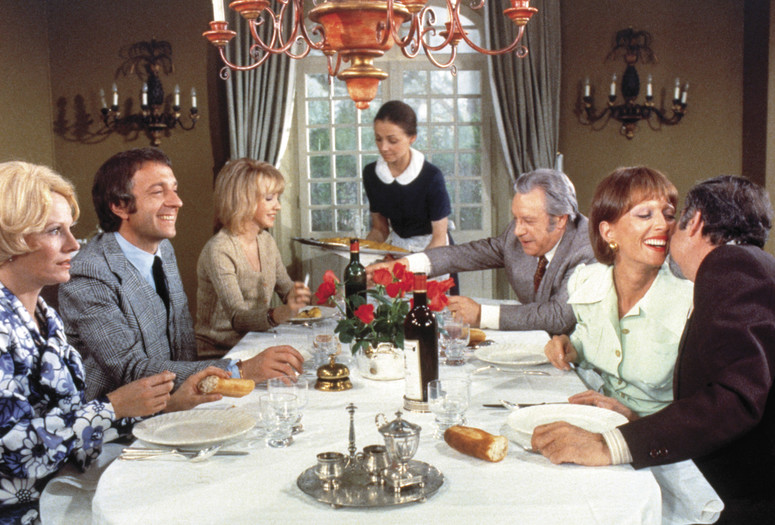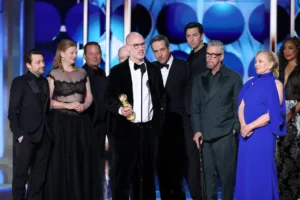‘The Discreet Charm of the Bourgeoisie’ Review: A Coalescing of Perplexing Surrealism and Social Satire

Photo Courtesy of MoMA
★★★★½
An exquisite delineation of the mere hinges of society
In a world that operates under the auspicious edification of the wealthy overpass, it’s not uncommon to depict the rigid social systems as a bitter abomination to the less fortunate brackets of the community. Constituents of the higher authority are also envisioned as the paramount status that maintains the lucidity of the pedestrian suburbs. And although it’s laborious to italicize one perspective as the more authoritative, the interior vitals of each concept encompass decisively inquisitive postulates. Through this broad scope — however — lies perplexing arcs that are packed to the brim with narrative capabilities. Even a baseline illustration of the modern class system remains a fundamentally diverting linchpin that echoes worldly potential. But in spite of the myriad of possibilities, the most prevalent impediment that arises when formulating a thesis within these confines is meshing an eccentric subtextual draw to combat the overwhelmingly saturated story arch.
One of the more integral auteurs who developed a perceptible voice through stabilizing the authentic, social class algorithm is the ever so proficient Luis Buñuel. Each of his intricately melded stories inquires upon some of the vaguer portrayals of humans in a state of pure skepticism. Additionally, Buñuel fragments his tales into a state of ambiguity as well as a setting of indefinite chronologies. Without any semblance of hesitation, his most intrepid conveyances of these thematic outlooks are most palpable in his 1972 surrealist motion picture entitled “The Discreet Charm of the Bourgeoisie.”
Within the front-half of Mr. Buñuel’s avant-garde masterstroke, each distinguishable segment of the expositional fragment reveals a mingling of prime sectoral points. Moreover, these contextual tones interweave idiomatic, cross-class confrontations with the glaring, hypocritical paranoia of the French bourgeoisie. But the crux of the elaborate plot evolves its indulgent details upon an incomparable feast of preeminent imagery and sensational screenwriting. Both Luis Buñuel and Jean-Claude Carrière (see the subsequent addition to the review at the bottom) implement a rather outrageous concentration of dream deception to toy with the subconscious perception from both the viewer and the very characters that are subtly transforming from an internal node of apparitional aromas.
In addition, Carrière and Buñuel blur the prominent division between reality and pseudo actuality. And as the climactic augmentations progress, the capability to conjure the cynical core of “The Discreet Charm of the Bourgeoisie” is — effectively — the point where the narrative asserts its consequential potency.
Another key facet of the tale’s stunning artistry is the optically emancipating use of vivid coloration. From even an imprecise perspective, each frame or composition articulated by cinematographer Edmond Richard maintains a diverse manifestation of whimsical undertones which — in turn — shed light on very saturated tints and hues deriving from both the bourgeoisie’s articles of clothing as well as the elegant, Parisian set-pieces. Due to this stunning visual prowess that’s exhibited by Mr. Richard, each transfixing — exterior tint evokes a confluent rift amongst the glamour and diverting artifice of the 1972 Parisian “rues.”
On top of the aforementioned point also lies some staggering performances from a lovely ensemble cast of characters who enchant a very baseline paradigm into a complete work of ingenuity. The ambitious presentation of each distinct French noble presents a person clinging to a dreamy island of spellbinding discourse while still attempting to endure the frantic life of wartime existence.
And within the confines of the denouement, Luis Buñuel flawlessly consummates his staggering satirical tale that embraces a heart just as transparent as a fresh pane of glass and a mind just as distorted as a potpourri dish of baked beans and moldy cheese. Furthermore — without any clear representation of a single tonally inconsistent set-piece or plot extract — “The Discreet Charm of the Bourgeoisie” splices together a true visionary’s paragon of unadulterated existentialism within its most defiant shades.
_______________________________________________________________________
Due to the recent passing of Jean-Claude Carrière, it only felt suitable to revisit one of his most remarkable screenplays and write a true review that evaluates the crucial nature of Carrière’s profound talent for the written word. His ability to convey ideas through emotionally poignant verbiage mingles beautifully with the directorial ingenuity of Luis Buñuel. Mr. Carrière will truly be missed as his dialogue-composing skills are — undoubtably — amongst the most influential across the whole of French cinema for the past, present, and future. Thank you Mr. Carrière for each and every one of your wonderful tales; you will be missed.
Streaming Services Provided By :











